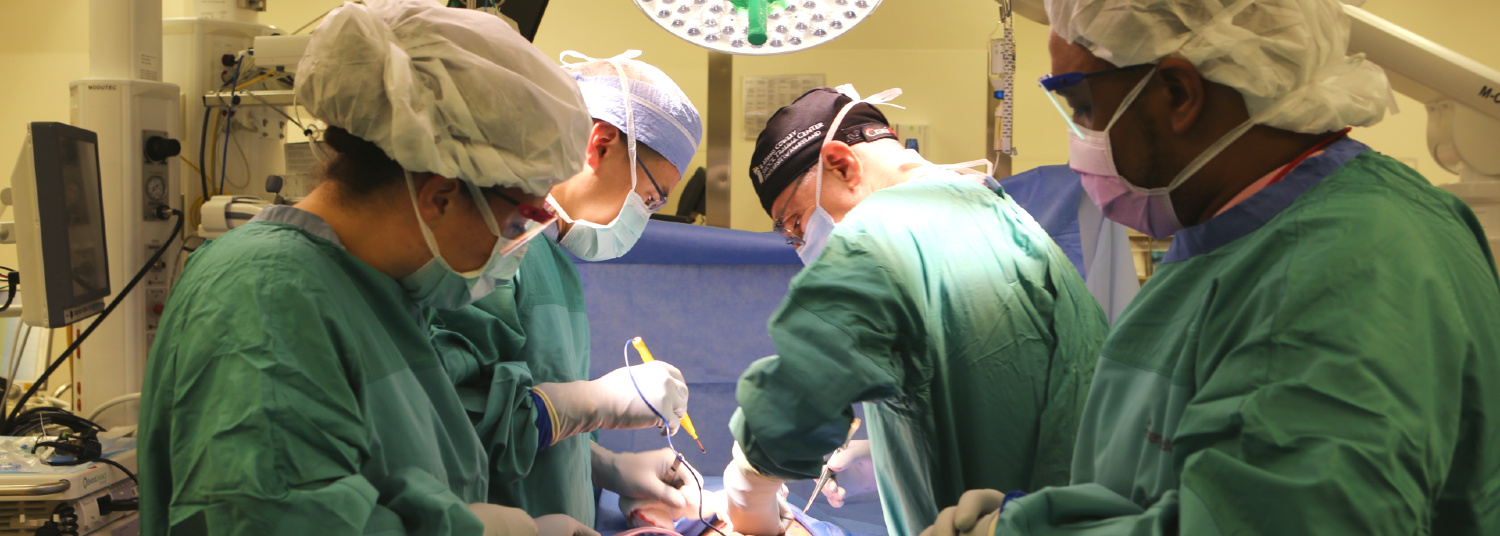First Year Rotation Schedule
Rotation Schedule for 1st Year SCC Fellows
| Rotation | Duration |
|---|---|
| Multi-Trauma Critical Care (MTCC) | 2 months |
| Neuro-Trauma Critical Care (NTCC) | 2 months |
| Surgical ICU (SICU) | 2 months |
| Cardiac Surgery ICU (CSICU) | 1 month |
| Trauma Teams | 2 months |
| Acute Care Emergency General Surgery (ACES) | 1 month |
| Critical Care Echocardiography | 0.5 month |
| Palliative Care | 0.5 month |
| Elective | 1 month |
Clinical Rotation Schedule
Multi-Trauma Critical Care (MTCC)
MTCC is dedicated to the treatment of the most critically ill polytrauma patients, patients with necrotizing soft tissue infections, and patients requiring veno-venous extracorporeal membrane oxygenation (V-V ECMO). The educational experience in the MTCC includes basic and advanced ventilator management, including airway pressure release ventilation (APRV) and proportional pressure support ventilation (PPS), continuous renal replacement therapy (CRRT), and V-V ECMO.
Neuro-Trauma Critical Care Unit (NTCC)
As the only neurotrauma center for the state of Maryland, NTCC is dedicated to the management of patients with severe traumatic brain and spinal cord injuries. NTCC is managed by a group of faculty with diverse educational backgrounds, which include surgical critical care, neurocritical care intensivists, and neurosurgeons. The educational experience of NTCC is focused on the management of intracranial pressure, intracranial pressure monitors, seizures, stroke, blunt cerebrovascular injury, paroxysmal sympathetic hyperactivity, and high cervical spinal cord injury.
Surgical ICU (SICU)
The SICU at STC manages post-operative patients for acute care surgery, thoracic, vascular, ENT/OMFS, and transplant (liver, kidney, and pancreas) services. The educational experience in the SICU includes management of severe pancreatitis patients in multiorgan system failure, open abdomen patients, complex and open aortic repairs, and liver transplant patients.
Cardiac Surgery ICU (CSICU)
The CSICU will involve the collaborative care of post-operative patients who have undergone interventions for aortic dissections, coronary artery bypass grafting, valve replacements, and heart and lung transplantation. Additionally, during this month you will manage a wide array of mechanical support devices including V-A ECMO, left and right ventricular assist devices (LVADs, RVADs), and Impellas.
Trauma Teams
STC is the busiest trauma center in the state of Maryland, allowing fellows to evaluate and treat the sickest population of trauma patients in our state-of-the-art trauma resuscitation unit (TRU) during their two months on the trauma service. The TRU is made up of 13 dedicated trauma beds managed by trauma nurses, trauma anesthesiologists, the trauma team and our trauma radiologists. The fellow on the Trauma service is responsible for leading the team of residents (surgical and EM). During a busy and exciting month, you are responsible for admitting all trauma patients when on-call, running trauma resuscitations, managing the trauma bays, and overseeing your team in the care of all trauma patients on your service.
Acute Care Emergency Surgery (ACES)
The ACES service is a primary center for the management of acute necrotizing pancreatitis in the state of Maryland. First-year fellows are active members of the surgical team on the ACES service. Fellows round with the surgical team and consult on medically and surgically complex and critically ill patients. Fellows operatively assist in complex emergency general surgery procedures such as necrotizing pancreatitis, pancreatic pseudocysts, complex upper gastrointestinal disease, mesenteric ischemia, abdominal compartment syndrome, open abdomen, and complex abdominal wall hernias. Rotating on the ACES service presents opportunities to collaborate with vascular, thoracic, cardiac, transplant surgery, orthopedics, and urology services.
Critical Care Echo
Working directly with a skilled ultrasonographer, fellows will learn how to complete a full critical care echocardiographic examination, interpret the data collected, and make recommendations on fluid status and fluid responsiveness. By the end of the rotation, fellows will have a strong foundation of TTE.
Trauma Anesthesiology
During this rotation, the fellow will be partnered with a group of trauma anesthesiologists to become more familiar with perioperative sedation, analgesia and paralytic medications as deemed appropriate for the clinical situation. Fellows will learn and apply various airway assessment scoring systems, how to maintain an open airway and provide adequate bag-mask ventilation, learn proper airway manipulation and intubation with and without a laryngoscope, and perform alternatives to conventional endotracheal ventilation, such as Bougie-assisted placement.
Elective Rotation Options
Fellowship Elective Rotation Options
- Critical Care Resuscitation Unit
- Neurocare ICU
- Johns Hopkins University - Bayview Burn ICU
- Medical or Pediatric ICU
- Trauma Anesthesiology
- Trauma Radiology
- Trauma Endovascular Surgery
- Trauma Infectious Disease
- Interventional Pulmonology
- Soft Tissue Surgery Service
- Emergency Medical Services
- Hyperbaric Medicine
SCC Didactic Curriculum
Monday: Trauma Case Conference with Dr. Scalea
A highlight of the STC/SCC fellowship includes this weekly case conference with Dr. Scalea and our trauma surgeons. Each week, the fellows currently rotating on the trauma service informally present an interesting case from their week to discuss with the trauma attendings. The conversation covers all aspects of the patient's presentation, surgical intervention and post-operative care. This is an excellent opportunity to learn from trauma surgery’s greatest physicians.
Tuesday: Critical Care Lecture Series - DC-5
A one-hour multidisciplinary critical care conference with critical care medicine fellows at the University of Maryland Medical Center, George Washington University, National Institutes of Health, Washington Hospital Center, and Walter Reed National Military Medical Center. Each week, a national expert lectures on topics relevant to critical care medicine fundamentals, system-based lectures, radiology, pharmacology, and procedural topics.
Wednesday: Surgical Critical Care Core Lectures
Thursday: General Surgery Department & STC Grand Rounds
- General Surgery Department & Shock Trauma Center Grand Rounds and M&M
- A fellow-led, one-hour weekly lecture (Journal Club, Grand Rounds, or Research Conference)
Friday: Multidisciplinary Critical Care Conference
A Friday afternoon lecture that is hosted by the CC Medicine Fellowship and is open to all members of the Critical Care discipline at UMSOM. A wide variety of topics are covered including various lectures on mechanical support, massive transfusion, EKG interpretation, DEI, nutrition, and many more.

